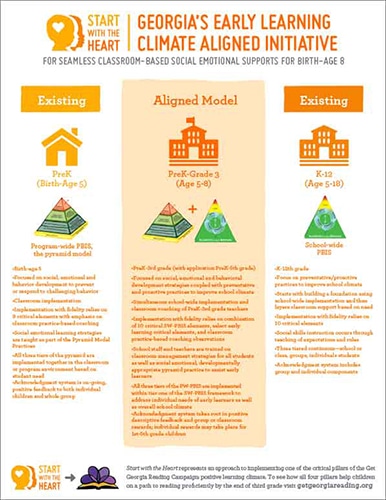Georgia is leading the way to ensure that educators in the early years and early grades are equipped with the knowledge and expertise vital for children to experience developmentally responsive classroom climates from birth through third grade.
Positive learning climates foster strong connections among children and the adults who care for them; ensure that children feel welcome, safe, and supported; and improve attendance, engagement, and learning. As children transition from early learning classrooms into elementary school classrooms, it is critical to continue practices used by early learning educators to nurture responsive relationships, create supportive environments, and provide targeted social emotional supports.
Through a partnership between the Metro Regional Education Service Agency, Georgia Department of Early Care and Learning (DECAL), and Georgia Department of Education, Georgia is innovating a practice that integrates strategies from the Pyramid Model for Supporting Social Emotional Competence in Infants and Young Children into the school-wide model.
The Early Learning Toolkit features a set of infographics, links to practical resources, and brief videos that illustrate what a positive learning climate looks and feels like; explain why “early learning” should extend through a child’s first eight years; and outline mindshifts and classroom practices that can build positive social-emotional engagement with early learners.
Key Resources
Early Learning Climate Videos
Administrators, teachers, parents, policymakers, and anyone with a stake in creating healthy classrooms in Georgia are encouraged to check out these videos, each less than 10 minutes in length, that illustrate what a positive learning climate looks and feels like as well as demonstrate how to apply positive learning climate practices in everyday classroom scenarios.
Why Positive Learning Climates Matter
Check out this introduction to the concept of positive learning climate and why it matters.
The Power of Positive Early Learning Climate for Children from Birth through Age 8
Find out why “early learning” should be classified as ages 0-8 instead of ages 0-5.
Five Mind Shifts Required to Create Positive Early Learning Climates
New mindsets are necessary to pave the way for successful and positive early learning climates in schools across Georgia.
Three Classroom Practices to Build Positive Social-Emotional Engagement with Early Learners
We encourage anyone with a stake in creating healthy classrooms in Georgia to use this in your trainings, curricula, presentations, and keynotes.
Georgia’s Response to the Need for Positive Early Learning Climates
The practice of integrating strategies from the preschool model of PBIS into the school-wide model helps lay a secure foundation for children during their first few years of elementary school.

